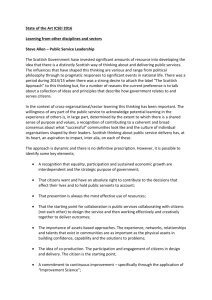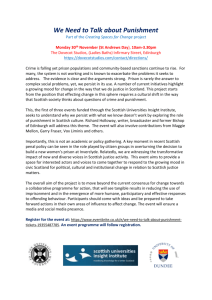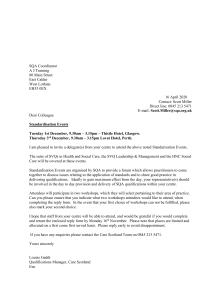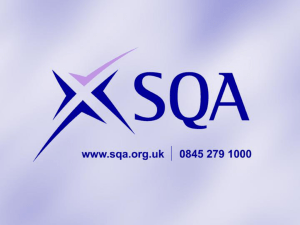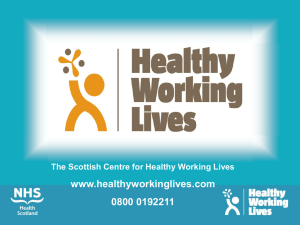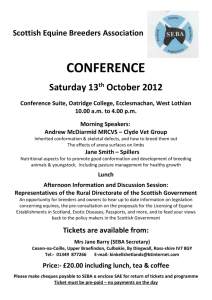GUIDE TO CORE SKILLS
advertisement
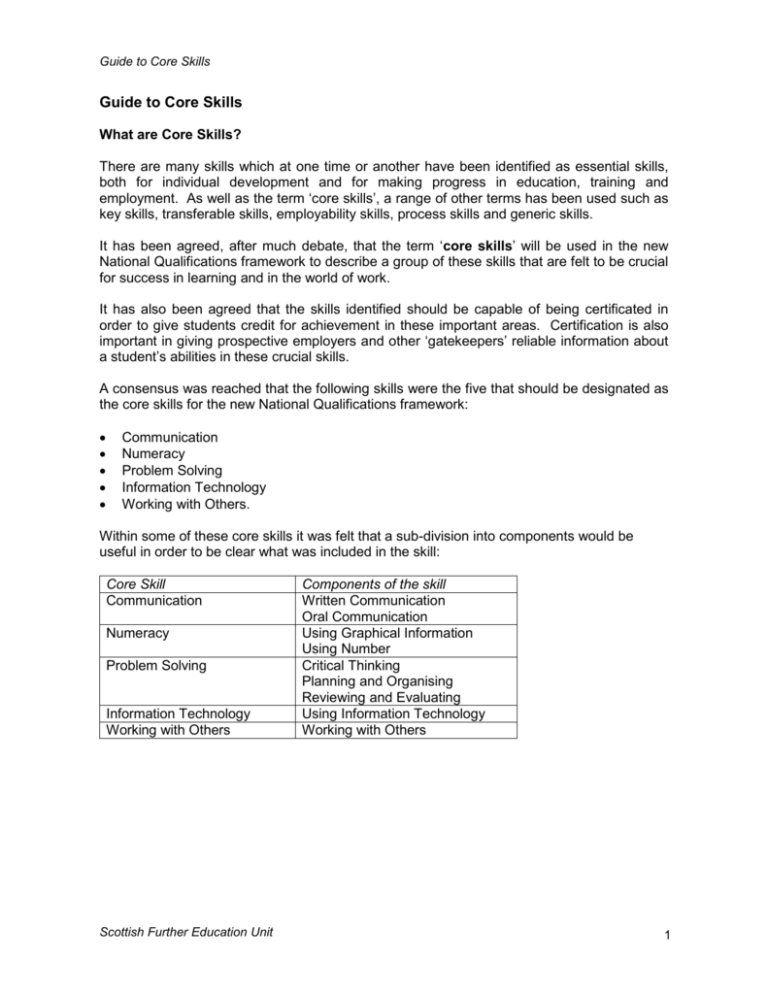
Guide to Core Skills Guide to Core Skills What are Core Skills? There are many skills which at one time or another have been identified as essential skills, both for individual development and for making progress in education, training and employment. As well as the term ‘core skills’, a range of other terms has been used such as key skills, transferable skills, employability skills, process skills and generic skills. It has been agreed, after much debate, that the term ‘core skills’ will be used in the new National Qualifications framework to describe a group of these skills that are felt to be crucial for success in learning and in the world of work. It has also been agreed that the skills identified should be capable of being certificated in order to give students credit for achievement in these important areas. Certification is also important in giving prospective employers and other ‘gatekeepers’ reliable information about a student’s abilities in these crucial skills. A consensus was reached that the following skills were the five that should be designated as the core skills for the new National Qualifications framework: Communication Numeracy Problem Solving Information Technology Working with Others. Within some of these core skills it was felt that a sub-division into components would be useful in order to be clear what was included in the skill: Core Skill Communication Numeracy Problem Solving Information Technology Working with Others Scottish Further Education Unit Components of the skill Written Communication Oral Communication Using Graphical Information Using Number Critical Thinking Planning and Organising Reviewing and Evaluating Using Information Technology Working with Others 1 Guide to Core Skills Why are Core Skills important? Core skills are felt to be important for several reasons: They are regarded as essential for success in learning. Schools, further education and higher education have all identified core skills as essential to the learning process and are building them into their educational programmes. Core skills are an essential element of Scottish Group Awards (see below), Scottish Vocational Qualifications, Higher National Qualifications and Modern Apprenticeships. Commercial and industrial bodies have, for some time, stressed the increasing importance of these skills for current and future employees. They feel that they are necessary for coping with the rapid changes taking place in the world of work including the increasing use of information and communications technology Individuals who have acquired these skills and have the certification to prove it are much more likely to be confident in their own abilities. They are also more likely to be able to cope with the increasing flexibility required in a rapidly changing society. Have we not been teaching these skills for years? Yes – core skills are not new and we have been teaching skills like these for years! However what is new is the: consensus about the five skills which will be part of the national framework agreement on the definitions of these five core skills acceptance that, where feasible, students should be given credit for achievements in these five core skills through certification. Why are there different levels of core skills? When it was agreed that core skills should be certificated in order to provide real evidence of student achievement it was recognised that the skills could be demonstrated at different levels of attainment. Since the new qualifications framework offers recognition of achievement at a number of levels it was agreed that the same levels should be used for core skills certification. At present core skills have been defined at five of these levels: 1. 2. 3. 4. 5. Access 2 Access 3 Intermediate 1 Intermediate 2 Higher. This means that someone could, for example, gain certification in the core skill of Numeracy at any of these levels. Scottish Further Education Unit 2 Guide to Core Skills How do we know what is required to gain a core skill at any of these levels? When it was agreed that the five core skills identified above could be demonstrated and assessed at the different levels, a ‘framework of core skills’ was developed. This described in some considerable detail exactly what was meant by each of the core skills at each of the levels. For example, it identified exactly what kind of tasks someone who had the skill of Information Technology at Intermediate 1 could carry out successfully. However, this framework looked fairly complicated and it was not in a form that was easily accessible. It was then agreed that core skills should be treated like any other qualification and that unit specifications should be developed. These unit specifications describe, in the same way as for any other type of unit specification, exactly what a candidate has to demonstrate in order be given credit for achieving that particular unit. This means that there are 25 unit specifications for core skills – five core skills at the five different levels. The unit specifications can be accessed directly on the Scottish Qualifications Authority (SQA) website: 1. 2. 3. 4. 5. Go to www.sqa.org.uk Click on ‘Centre Resources’ Click on ‘Qualifications Database’ Click on ‘find a National Unit by title or part title’ Type in the title of the unit OR type in ‘Core skills units’ in the key words window; this will provide a list of all the units and clicking on any one of the names will allow you to view and download the full specification for that unit. How are core skills assessed and what is meant by ‘embedded’ core skills? Core skills can be assessed in two main ways. Many units and courses involve assessment which, as well as producing evidence of achievement in a particular subject area, also produces evidence of achievement in core skills. For example it is clear that evidence of: achievement in mathematics courses and courses like Mechanical Engineering is likely to provide evidence of Numeracy skills achievement in science courses and subjects like Technological Studies is likely to produce evidence of problem-solving achievement in computing courses and in administration courses is likely to produce evidence of IT skills. An audit has been done by the SQA of units and courses to determine which of these provide, through the mandatory assessment, the real ‘hard’ evidence of achievement of the core skills in this way. Where evidence of achievement of a core skill is demonstrated in this way candidates are automatically given credit for achievement of the particular core skill. We describe the core skill as being ‘embedded’ in the unit or course. Scottish Further Education Unit 3 Guide to Core Skills The second way of assessing core skills is by the use of ‘free-standing’ core skills units. This is done in the same way as for any other unit and simply means: using one of the core skills unit specifications mentioned above teaching the skills in an appropriate context gathering the evidence required to prove achievement of the unit through arranging appropriate tasks. Are there NABs (National Assessment Bank) packs for the core skills units? Yes – NABs have been produced for each of the core skills units and these will help centres to gather the appropriate evidence to demonstrate achievement of the units. How can I find out which core skills are embedded in which units/courses? SQA have published a booklet with this information – Catalogue of Core Skills in National Qualifications. This has a list of courses and units and indicates which core skills are ‘embedded’ in each of these courses and units. This information can also be found on the SQA website: 1. Go to www.sqa.org.uk 2. Click on ‘Centre Resources’ 3. Click on ‘Centre Documentation and Publications’ 4. Click on ‘Catalogue of Core Skills in National Qualifications’. Can students achieve certification for core skills in subjects where the core skill is not automatically embedded? Support materials on the CD-ROM “Management Information CD Including Core Skills” (further details below) include a number which show how the core skills of Using Information Technology and Working with Others can be delivered via a number of subjects in which the core skill is not automatically embedded. The CD also contains examples of activities which are not subject-specific and which can be used to deliver a number of the core skills through a single activity. For example, one pack of materials is designed to show how the three core skills of Problem Solving (PS), Working with Others (WwO) and Information Technology (IT) can be integrated and assessed as part of a project where students provide a service, produce a product or organise an event. I have heard of ‘Diagnostic Tools’ for core skills – what are they? A project is under way which is called ‘Diagnostic Assessment for Core Skills (ICT Project)’. This is a collaborative venture between the Scottish Further Education Unit, Plato Learning and a group of colleges. The purpose is to develop online diagnostic tools that will enable the identification of individual strengths and weaknesses in three of the core skills – Communication, Numeracy, and IT. These tools are intended to be used to identify the level of competence of students and so assist in placing them at the appropriate level of core skill provision. The project is due to be completed before the summer of 2002, with a launch and dissemination around that time. Scottish Further Education Unit 4 Guide to Core Skills What is the connection between core skills and Scottish Group Awards? In order to obtain a Scottish Group Award (SGA), candidates need to complete a specified number of courses and units, as described in the specifications for each Group award. They must also acquire a specified core skills profile in order to gain the award. For example in an Intermediate 2 SGA, candidates would normally be expected to achieve a minimum of two courses at Int 2, and eight units at Int 1, plus the five core skills at a minimum level of Int 1. It should be noted that students are always encouraged to achieve the core skills at as high a level as possible since this could be a benefit in a future progression route. Where can I get more information about core skills? Apart from the sources mentioned above, there are many other sources of information about core skills. Some of these are HSDU publications that should be in all centres: Title of Material Core Skills: Information for Senior Managers in Colleges* Core Skills: Information for Senior Managers in Schools* Core Skills: Information for Senior Managers in Special Schools* Implementation Studies in Colleges – Core Skills Core Skills Information for Senior Managers Supplementary Information for Further Education* Core Skills Information for Senior Managers Supplementary Information for Schools Core Skills Checklists (for FE colleges) Core Skills: Information for Senior Managers in Special Schools – Supplementary Information* Core Skills: Information for Implementation* Core Skills – Implementation Studies in Colleges* Ref No HS/72 HS/71 HS/70 Published Jun-98 Jun-98 Aug-98 HS/81 HS/94 Mar-99 Sep-99 HS/93 Sep-99 5849 HS/102 Sep-99 Nov-99 HS/108 HS/109 Jun-00 Aug-00 Additional paper copies of these are no longer available, but all of those marked with an asterisk are on a CD that was distributed in December 2001 by Learning and Teaching Scotland to all centres. The title of the CD is “Management Information CD Including Core Skills”. Core skills support materials have also been produced by the Open, Flexible and Distance Learning project and again these were automatically distributed to all centres by Learning and Teaching Scotland. Some of these materials are also in an interactive form online and can be found at www.LTScotland.com/nq/catalogue/ofdl/enhancement Scottish Further Education Unit 5

